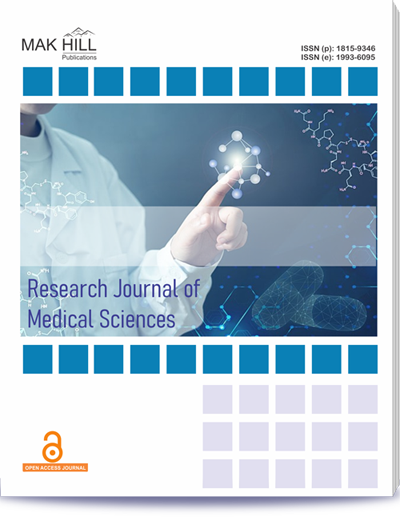
Research Journal of Medical Sciences
ISSN: Online 1993-6095ISSN: Print 1815-9346
1
Views
4
Downloads
Executive Dysfunction in Patients with Alcohol Dependence Syndrome After Six Weeks of Abstinence: A Descriptive Study from a Tertiary Care Center in South India
Rose Johnson and Varghese P. Punnoose
Page: 664-666 | Received 25 Sep 2024, Published online: 30 Nov 2024
Full Text Reference XML File PDF File
Abstract
Chronic alcohol consumption is known to cause cognitive deficits, particularly in executive functions. Early detection of these dysfunctions could predict risk for persistent cognitive impairment or alcohol-related dementia. Primary: To estimate the prevalence of executive dysfunction among patients with Alcohol Dependence Syndrome (ADS) after 6 weeks of abstinence. Secondary: To identify factors associated with executive dysfunction in this population. A descriptive study was conducted among 100 patients diagnosed with ADS who attended the psychiatry outpatient clinic of Government T.D. Medical College, Alappuzha, after 6 weeks of abstinence. Tools used included the Montreal Cognitive Assessment (MoCA), Stroop Test, Trail Making Test (TMT), and Controlled Oral Word Association Test (COWAT). Statistical analysis was performed using SPSS v18. Executive dysfunction was detected in 29% of patients. Significant associations were found with past history of delirium (p<0.001) and relapse episodes (p<0.001). No significant correlation was found with age, marital status, or quantity of alcohol intake. Executive dysfunction is prevalent in ADS patients even after a 6-week abstinence period. History of delirium and relapse episodes are key predictors. Routine cognitive screening is recommended for ADS patients during early abstinence to guide rehabilitation strategies.
How to cite this article:
Rose Johnson and Varghese P. Punnoose. Executive Dysfunction in Patients with Alcohol Dependence Syndrome After Six Weeks of Abstinence: A Descriptive Study from a Tertiary Care Center in South India.
DOI: https://doi.org/10.36478/makrjms.2024.11.664.666
URL: https://www.makhillpublications.co/view-article/1815-9346/makrjms.2024.11.664.666